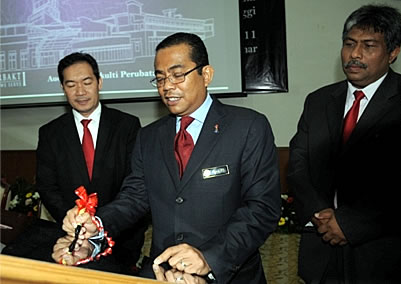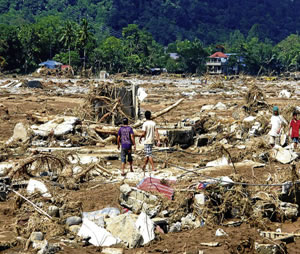- Details
- Category: 2011
 12
12
Starting March 2012, the Dubrovnik International University (DIU) and the Institute for Cultural Diplomacy (ICD) in Berlin, Germany will be offering the graduate Master of Arts program in International Relations and Cultural Diplomacy. The program will combine the traditional academic components of international relations with a new focus on the role of soft power and cultural diplomacy in contemporary global affairs.
More than just a discipline of Political Science or Political Theory, the 2-year International Relations and Diplomacy program is said to also dwell on the perspective of art and culture, economics, law, and other social sciences.
Further information on the program, including admissions requirements and deadline, can be found here.
Further information about the program curriculum is found here.
- Details
- Category: 2011
 13
13
Dr. Oscar B. Zamora and Dr. Ma. Cristeta Cuaresma have been appointed by the University of the Philippines Board of Regents to lead the state university's Office of the Vice Chancellor for Instruction (OVCI) and Office of the Vice Chancellor for Administration (OCVA), respectively. Their appointments took effect on 24 November 2011.
As the Vice Chancellor for Instruction, Dr. Zamora assists the Chancellor in: coordination and review of the instruction and student programs of the University; formulation and implementation of University academic policies, rules, standards and basic procedures; and establishment of linkages with government and other outside agencies.
On the other hand, Dr. Cuaresma takes charge of the OVCA, which is responsible for the administrative and business management and operation of the University, including the supervision and control of its seven administrative offices namely: Accounting, Business Affairs, Budget Management, Cashier, Human Resources & Development, Records Management and the Supply Property and Management.
Under the leadership of Dr. Rex Victor O. Cruz, UPLB's 8th Chancellor concurrently the University Consortium Chief Executive Officer of the university, Vice Chancellors Zamora and Cuaresma will remain as UPLB's point persons for the University Consortium - Dr. Zamora as UC Executive Officer, and Dr. Cuaresma as the UC Contact Coordinator.
- Details
- Category: 2011
 19 3
19 3
SERDANG - The Veterinary Medicine Faculty Complex, which boasted UPM’s University Veterinary Hospital (UVH) as the most advanced veterinary hospital in Southeast Asia, was launched in November 2011. Minister of Higher Education, Dato’ Seri Mohamed Khaled Nordin was invited as guest of honor in the said launching.
The Deputy Vice Chancellor (Research and Innovation), Prof. Ir. Dr. Mohd. Saleh Jaafar, said that it is the first veterinary teaching hospital in Malaysia equipped with facilities that fulfil international standards.
Assoc. Prof. Datuk Dr. Bashir Ahmad Fateh Mohamed, Dean of the Faculty of Veterinary Medicine said that the complex includes an Academic Block which consists of 4 teaching laboratories, 5 lecture halls, 13 tutorial rooms, an anatomy museum, an auditorium, a computer laboratory, a seminar room and a library which can accommodate 1,000 students including staff. The hospital also includes 12 diagnostic laboratories, 7 operation theaters, a Large Animal Unit, a Small Animal Unit, a Surgery Unit, theatres, a mobile clinic, a pharmacy unit, and also a radiologist and imaging unit.
Both small and large animal wards can accommodate up to 40 and 80 animals, respectively, and can handle at most 50 cases per day. While the wards are open to the public from 8:30 AM to 4:30 PM daily, there is a mobile clinic that operates 24 hours-a-day.
"There are 50 consultants, 22 veterinary officers, and 60 support staff from various categories working in this hospital which has started operating since January this year,” Dr. Jaafar explained.
The Faculty of Veterinary Medicine, through the University Veterinary Hospital, has the potential to holistically lead the needs of the country in overcoming infectious diseases which would harm human beings besides providing specific services in veterinary medicine, surgery, and diagnostic laboratories.
“The employability of Veterinary Medicine graduates is very high. For example, the Veterinary Services Department in Malaysia is still in need of 120 veterinarians to fulfil the long-vacant positions,” Dr. Jaafar said.
In the near future, Dr. Jaafar also proposed that the curriculum of the Malaysian veterinary program be accredited internationally to ensure that their graduates will be recognized worldwide.
The Veterinary Medicine Faculty, which was built in 1973, has produced many experts and doctors in veterinary medicine for Malaysia and played an important role in the country’s knowledge transformation in the veterinary area. This faculty is the first higher education institution to obtain an accreditation in teaching, research, and professional services through MS ISO 9001 in 2000 and MS ISO/IEC 17025 in 2008.
During the launching ceremony, two memoranda of understanding (MoUs) were signed between the faculty and Malaysian Veterinary Services Department (JPV), and with the World Wide Fund for Nature Malaysia (WWF Malaysia). These MoUs focussed on teaching, research, and professional services activities that could benefit both parties.
Condensed from: UPM News | 1 Nov 2011
- Details
- Category: 2011
 19 1
19 1
Farmers are likely to ignore the risks of further encroaching into upland forests because climate change is forcing them to, experts say.
Edwino Fernando, a forest botanist of the University of the Philippines Los Baños (UPLB), and Roberto Cereno, deputy director of the Makiling Center for Mountain Ecosystems, explored this scenario with officials of the Department of Environment and Natural Resources (DENR) during the first weeks of December 2011.
Reynald Yawan, Cordillera regional technical director of the Protected Areas Wildlife and Coastal Zone Management Service, said DENR and Department of Agriculture (DA) had been trying to stop the further expansion of farms in forests.
The DA invested in organically-grown indigenous rice for upland farms because these areas are now over-farmed, said Dante Delima, coordinator of DA’s national rice program.
These farms, however, thrive because they have become sources of vegetables for high-end markets such as those in Metro Manila. Since the 1980s, any of these farms have displaced pine forests in Benguet and Mt. Province, often with the help of government roads that Fernando described as "arteries of destruction".
Since 2009, typhoons have dumped higher volumes of rainfall on the Cordillera, triggering erosions that destroyed upland farms.
But the impact of extreme climate change is an increase in temperature, "so upland farmers would need to penetrate more mossy forests to grow temperate vegetables," Cereno said.
In their book, Biodiversity and Natural Resources Conservation in Protected Areas of Korea and the Philippines, the UPLB experts said "the growing demand for vegetables and tamed law enforcement have encouraged more clearing and burning of mossy forests and [their] conversion into farms on a commercial scale."
Source: Philippine Daily Inquirer | 7 December 2011
- Details
- Category: 2011
 19 2
19 2
YOGYAKARTA - Biotechnology research on genetic engineering of food crops is needed to increase world food production in order to combat world poverty and hunger by year 2050. Therefore, the development of biotech crops is expected to increase yield and global farm income, and reduce carbon emissions and the use of pesticides.
This was highlighted by Dr. Julian Adams, the Asia Coordinator of Biosafety Program and Biological Sciences and a faculty member of the University of Michigan, United States, in a public lecture entitled,Genetic Engineering of Crops, held at the Graduate School of Universitas Gadjah Mada (UGM) on 6 December 2011. Dr. Adams said that in the future, genetic engineering of crops is needed to increase food production amid the threat of drought due to climate change and global warming. "Due to drought, the average annual loss in crop yields in tropical regions is 17%," he said.
Crop varieties that have resistance to heat and transgenic varieties with tolerance to changes in ozone (O3) and high CO2 levels are needed in the future. From the research, it is known that rice yields are now influenced by global warming. For instance, a 1o C increase in the night temperature can already cause a of 105 in yield.
Dr. Adams mentioned that it is urgent to conduct genetic engineering in sugar cane, corn, wheat, rice, cotton, and other crops which are drought, salt, and flood tolerant. He said these plants are needed by all countries in the world.
Moreover, with global warming comes the threat of polar ice melting that can cause a rise in sea level, which in turn could threaten the existence of 4000 islands in Indonesia, aside from the increase in salinity in coastal areas, added Dr. Adams.
Source: UGM News report | 12 Dec 2011
 12
12


















